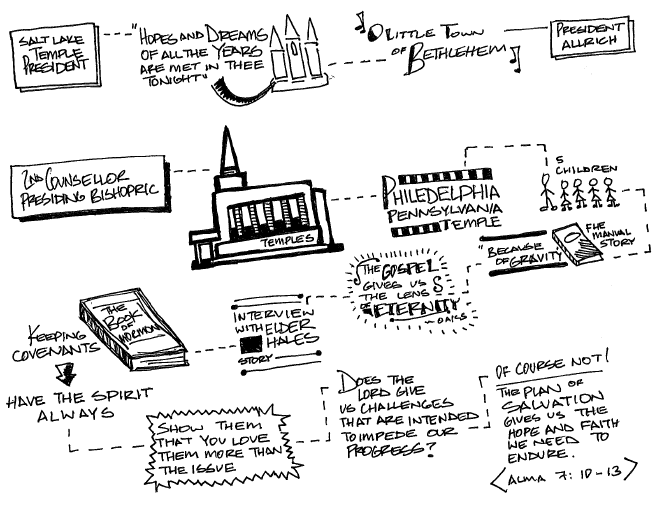We had stake conference this month with Bishop Dean M. Davies of the Presiding Bishopric as well as the President of the Salt Lake Temple. Before the meeting we had the chance to meet Bishop Davies and exchange quick pleasantries. Before being called in this most recent conference to the Presiding Bishopric, Bishop Davies served in the Temple Department, helping select sites for temples. He drew on that experience as he spoke to us, sharing insights into revelation as well as the miracles that will accompany our efforts as we strive to do the work of the Lord.
Tag Archives: Temple

The Temple: No Sacrifice is Too Great
President Thomas S. Monson said,
Why are so many willing to give so much in order to receive the blessings of the temple? Those who understand the eternal blessings which come from the temple know that no sacrifice is too great, no price too heavy, no struggle too difficult in order to receive those blessings. There are never too many miles to travel, too many obstacles to overcome, or too much discomfort to endure. They understand that the saving ordinances received in the temple that permit us to someday return to our Heavenly Father in an eternal family relationship and to be endowed with blessings and power from on high are worth every sacrifice and every effort.
Thomas S. Monson
“The Holy Temple–A Beacon Unto the World”
April 2011 General Conference
Focus on Family Names
Elder Russell M. Nelson taught,
“Here, on this side of the veil, there are limitations of available time and temples. This means that choosing to identify and perform ordinances for our own kindred should receive our highest priority. The Spirit of Elijah will inspire individual members of the Church to link their generations, rather than submit lists of people or popular personalities to whom they are unrelated.”
“The Spirit of Elijah”
April 1994 General Conference
Vicarious Temple Work
Several years ago Elder Howard W. Hunter said:
“Does it seem reasonable that persons who have lived upon the earth and died without the opportunity of baptism should be deprived throughout eternity? Is there anything unreasonable about the living performing the baptisms for the dead? Perhaps the greatest example of vicarious work for the dead is the Master himself. He gave his life as a vicarious atonement, that all who die shall live again and have life everlasting. He did for us what we could not do for ourselves. In a similar way we can perform ordinances for those who did not have the opportunity to do them in lifetime.”
Quoted by Russell M. Nelson,
October 1994 General Conference
Temple and Family History are Christlike Activities
On the nature of the work we do take family names to the temple, Boyd K. Packer said,
“Now, there are those who scoff at the idea of vicarious ordinances performed for the salvation of souls. They think it all to be very strange.
No thinking Christian should be surprised at such a doctrine. Was not the sacrifice of Christ a vicarious offering for and in behalf of all mankind? The very Atonement was wrought vicariously.
The Lord did for us what we could not do for ourselves. Is it not Christlike for us to perform in the temples ordinances for and in behalf of those who cannot do them for themselves?”
“Covenants”
April 1987 General Conference
Home: Heaven on Earth
While home can be a heaven on earth, it can also be a refiner’s fire. Our finest and weakest moments often involve family and how we treat them. A member of our stake presidency remarked that for his family, Family Home Evening was the only boxing match that began with a prayer. Joking aside, however, to fail to understand how important the family is to God’s plan is a critical mistake. David O. McKay taught us that no success can compensate for failure in the home. Harold B. Lee affirmed this teaching, saying that the most important work we will do will be with in the walls of our own home.
A Pattern for All Things
As the Lord set about to restore His gospel and church upon the earth, He told the Prophet Joseph,
“And again, I will give unto you a pattern in all things, that ye may not be deceived; for Satan is abroad in the land, and he goeth forth deceiving the nations—” (D&C 52:14)
When the Lord says he will give us ‘a pattern in all things,’ I believe that’s dualistic. Meaning, while He has given us a universal pattern and example in the life and mortal ministry of the Savior Jesus Christ, I also believe He also gave us multiple patterns and shadows throughout the scriptures, church history and in our worship that give us a pattern for every thing. Each one of these smaller patterns serves to help us understand and apply the Savior’s life and grace in our own lives.
So, then, given our theme of creating a heaven on earth in our homes. What patterns from the Savior and from the gospel plan might help us establish celestiality under our ceiling? This won’t be an exhaustive exercise, but it certainly warrants becoming one. I will focus on a few ideas as a point of origin.
The Sermon on the Mount
When I consider what passage of scripture might serve as a starting point for understanding the life and example of the Savior, there are few passages that compare to Christ’s Sermon on the Mount. Consider some of the principles taught therein and how ready they stand for application to our family life:
- Mourn with those who mourn
- Be a peacemaker
- Hunger and thirst after righteousness
- Love your enemies
- Avoid divorce, forgive
- Virtue in thought, word, deed
- Avoid anger, forgive, seek reconciliation
I admit that I readily consider these principles in relation with my fellow man, you know, ‘being a light unto the world.’But the older I get, the more I realize how my family truly means the world to me. Oh then, ois there a better place to start than in the walls of my own home? If I responsibility as salt to savor and preserve, shouldn’t my family take top priority as the most natural and most valuable place to start. If my home spoils, what have I?
The Lord’s House
With a list of practical principles provided by the Sermon on the Mount, is there a definitive example of the ideal home-setting? I believe there is in the House of the Lord. Now, if you are like me, you might look around your home and see all the toys strewn about, or the plates in the sink and wonder how much of the temple can really be applied on an everyday basis, but don’t let discourage you. Consider how the House of the Lord is place where we can fill the spirit, learn, grow, become an eternal family and generally become spiritually prepared so that when we live that house, we will be protected from Satan’s power and temptations. Are our homes much different in purpose? There’s a great deal we can learn from the temple in establishing our homes.
Bringing the Two Together
Let’s consider these patterns together. For example, we could make a chart where we identify in one column the teachings of the Savior in the Sermon on the Mount, and in a second column identify patterns from the temple that exemplify that principle. Then, in a third column we might identify possible applications in our own home. An example:
Teaching: Blessed are the peacemakers: for they shall be called the children of God.
From the Temple:
- If we need to talk, we are invited to whisper to preserve the reverence of the House of the Lord
- The Lord’s House is a house of order and there’s always someone there to help and guide you (minimizes confusion which disrupts peace)
- Temple activities focus on gospel doctrine and making covenants
- Temples closed on Mondays
- No one is forced to do anything in the temple, it is done by our own free will and choice
- If we have unkind feelings toward anyone participating, we are invited to withdraw
- We make covenants with God to obey, sacrifice and give our full effort to establishing the kingdom of God.
Possible Applications at Home
- Establish the expectation (and example) that if we need to discuss something, we do so without raising our voices
- As a parent, I can provide order by treating my children with integrity.
- I can have regular personal interviews with my children (be there for my children, to answer questions and minimize confusion)
- We don’t allow anything to compete with Family Home Evening on Monday night.
- We respect the agency of our family members, by teaching doctrine, helping children understand consequences and give them the opportunity to act
- We help our children from an early age understand and prepare to keep Gospel Covenants
Home can be a heaven on earth and I know that our Father in Heaven has all the power in the universe to help us succede as a family. That’s why we have the Plan of Salvation and the restored gospel understanding of it. Most of all, because of the Atonement of Jesus Christ, we can find the grace, peace and inspiration we need to make our journey back home.
Temple Work and Family History A Protecting and Refining Power
President Boyd K. Packer of the Quorum of the Twelve taught us about how temple work and family history can bless our life,
“No work is more of a protection to this Church than temple work and the family history research that supports it. No work is more spiritually refining. No work we do gives us more power. No work requires a higher standard of righteousness.”
President Boyd K. Packer
“The Holy Temple,” Ensign, Oct. 2010, 35
Temple Work More Meaningful When Done For Family
President Monson illustrated how temple work and family history work go together,
“In my own family, some of our most sacred and treasured experiences have occurred when we have joined together in the temple to perform sealing ordinances for our deceased
ancestors. . . . The all-important and crowning blessings of membership in the Church are those blessings which we receive in the temples of God.”
President Thomas S. Monson
In Conference Report, Apr. 2011, 87; or Ensign, May 2011, 93
Family is Most Important
President Henry B. Eyring taught,
“There is nothing that has come or will come into your family as important as the sealing blessings. There is nothing more important than honoring the marriage and family covenants you have made or will make in the temples of God.”
“Families Under Covenant“, April 2012 General Conference – Priesthood Session


You must be logged in to post a comment.